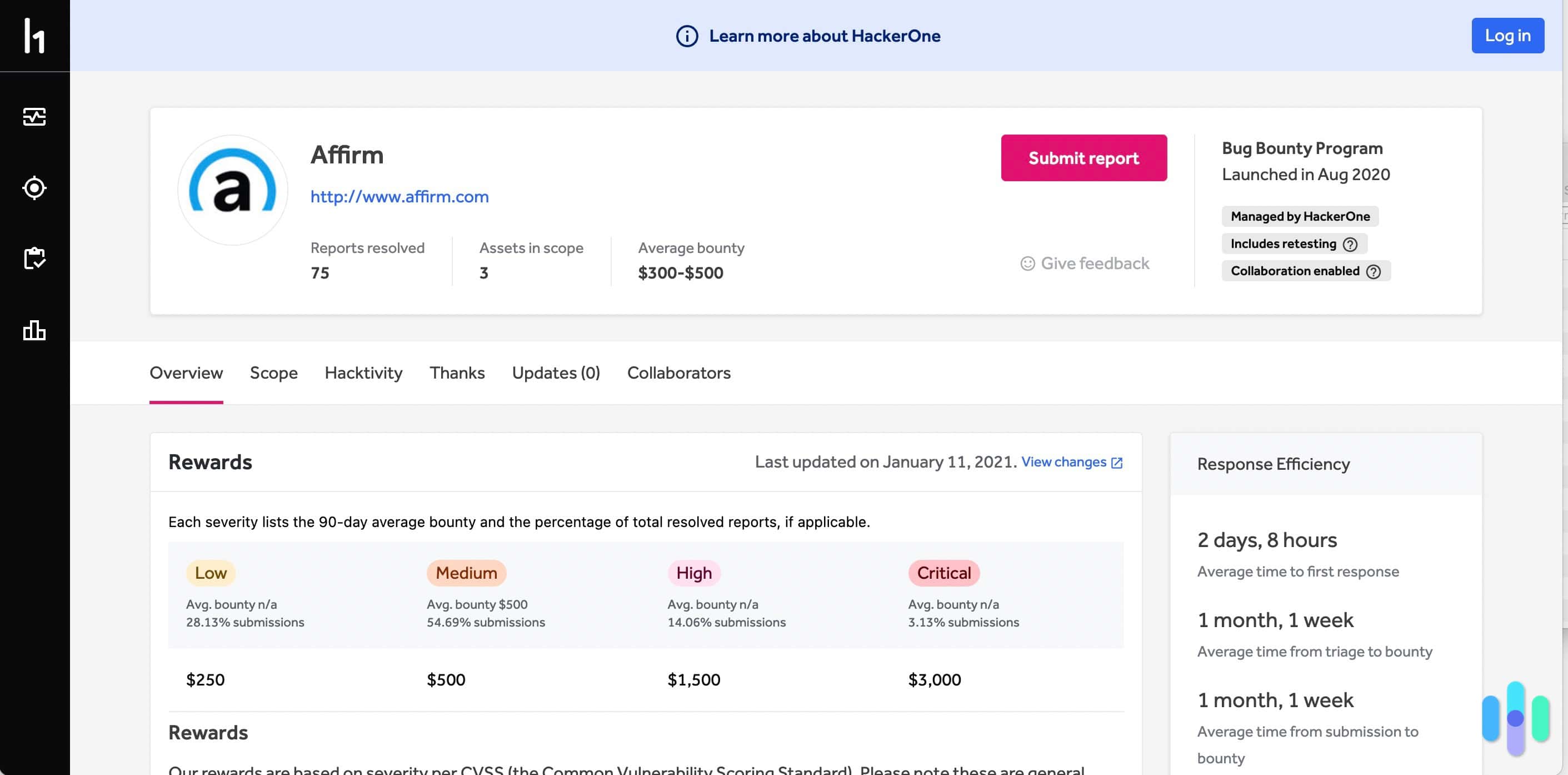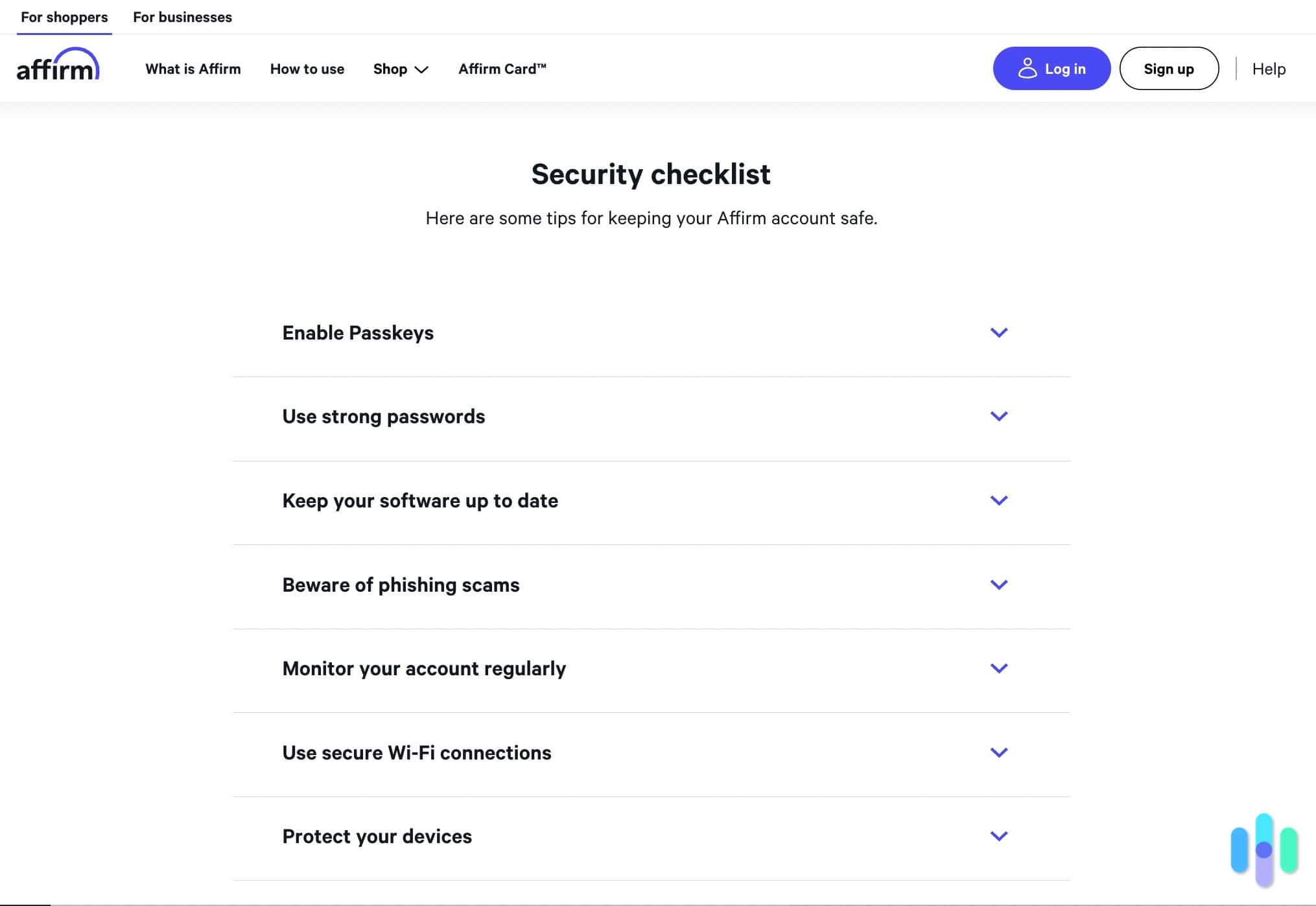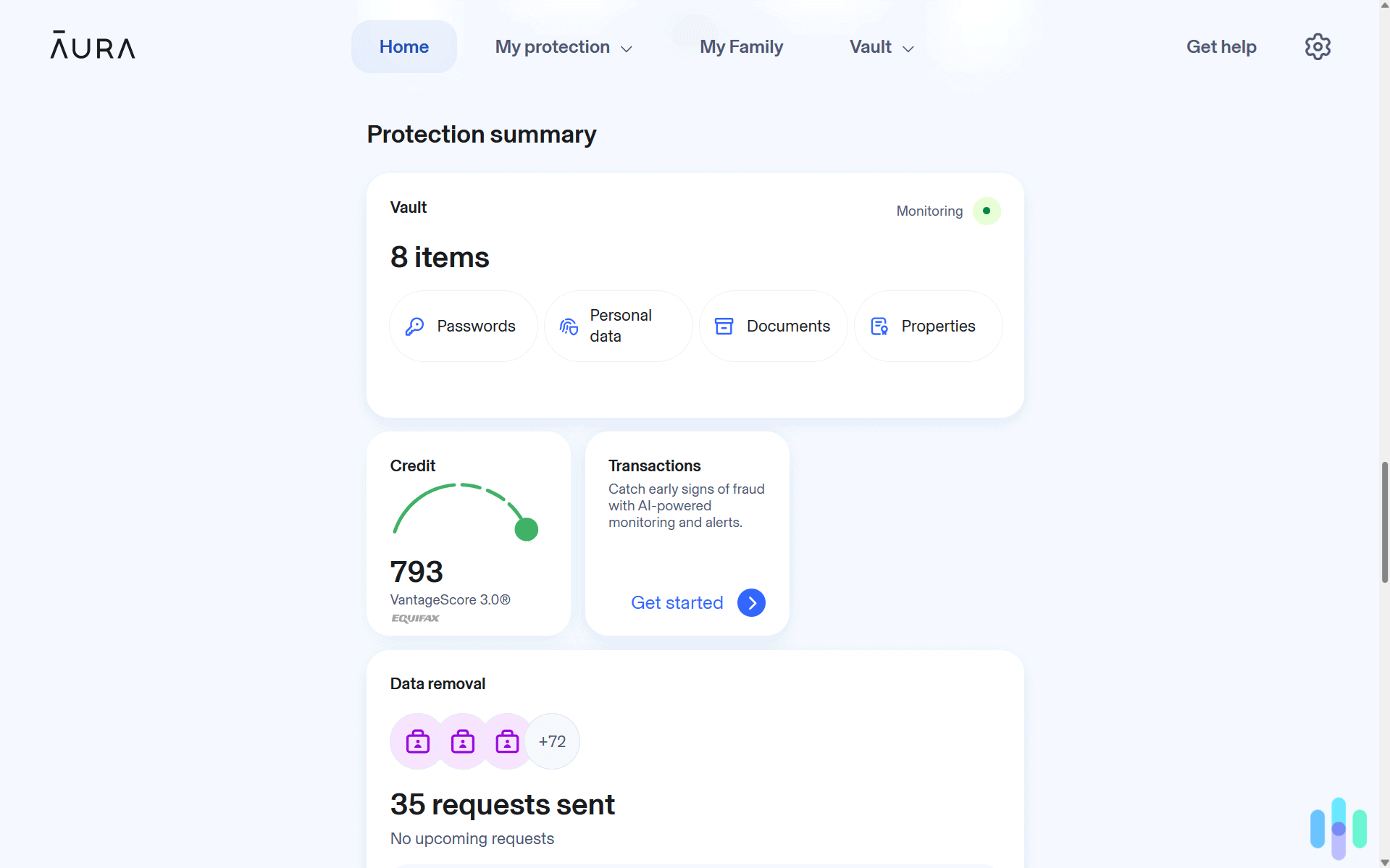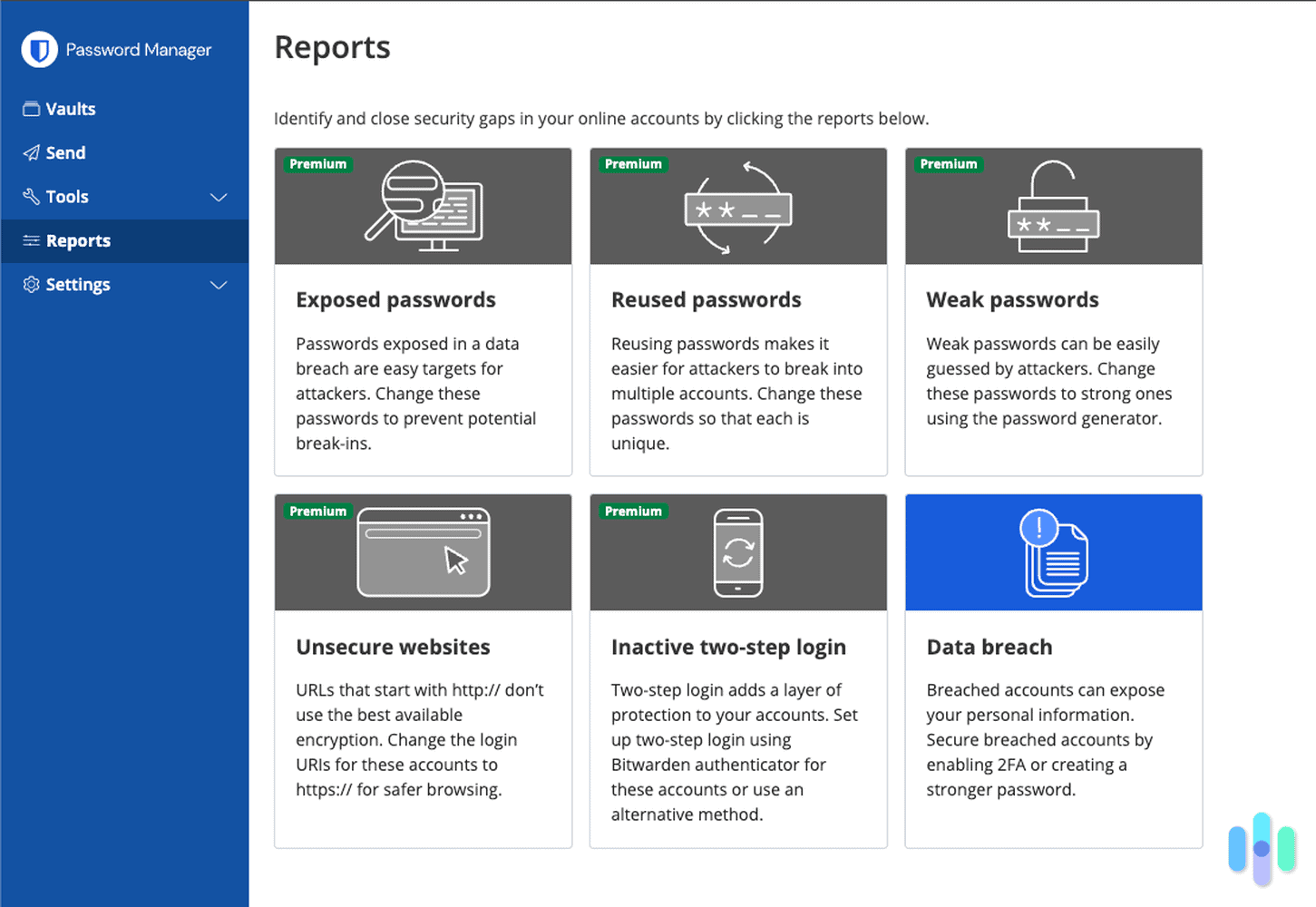Have you found yourself at an online checkout with Affirm as an option, but still aren’t sure if it’s legit or safe? As security experts who have used Affirm several times, we’ve found that Affirm is generally safe. So, yes, it’s a real payment option from a trusted fintech company.
However, we also noticed several things that might make Affirm risky for some customers. For example, as a buy now, pay later merchant, Affirm doesn’t offer the same level of protection as other credit cards and financial institutions.
That’s not to say it doesn’t take measures to safeguard consumer’s personal information, because it does. However, there are key differences that you should consider before fully choosing Affirm over other merchants. These include its positioning on loan protection, data security, refund and return policies, interest rates, and how it resolves disputes. Continue reading our safety guide on Affirm to figure out if it’s the most secure option for you.

Did You Know: 29 percent of online users were victims of account takeover fraud in 2024, with social engineering and phishing being the top attack vectors. Here’s how to protect yourself from account takeover incidents.
How Does Affirm Work?
Affirm has become a leading player in the buy now, pay later (BNPL) market, competing with services like Klarna and Afterpay. Essentially, Affirm is a financial provider that allows its users to buy items “now” and pay for them “later.”
But how does it really work? Well, when you’re at the checkout online and find yourself staring at a far-too-large total (we blame the shipping too), Affirm may pop up as a payment option. If you decide to go that route, Affirm will first review your credit, your payment history within Affirm, and a few other financial details to determine whether or not they’ll approve the loan amount.
If you get approved, you’ll have the option to add more items to your basket — we’re kidding, you probably shouldn’t. In all seriousness, if you get approved then you’ll be presented with a few different payment plans. These will vary based on how much your purchase is, but will range from one to 48 months.
Three, six, and 12 months remain the most popular options. Depending on which option you choose, the total amount plus interest (if any) will be displayed upfront so you always know how much you’re paying.
Approval decisions typically happen in real-time, taking just seconds to process. Once you confirm a payment plan, you’ll make an initial payment (usually 25 percent of the purchase price) and then pay the remaining balance according to your chosen schedule. Happy shopping!
Did You Know: You have many payment options for online shopping! Several stores accept payments directly from Venmo. Here’s how to stay safe when using Venmo.
Affirm Security Practices
We analyzed Affirm’s Trust Center1 and security documentation2 to evaluate their current security practices. The company maintains SOC 2 Type II certification and complies with PCI DSS standards. These show that they are committed to data security. We found that it uses a healthy combination of safety methods to keep user data and transactions protected. Although these pages on the company’s website left out concrete details, we can assume it’s for security reasons. Still, here’s an overview of the security practices implemented by Affirm:
- Secure transmission protocols. Affirm ensures safe and private communication between customers and servers. t employs industry-standard protocols, including HTTPS with TLS 1.2 or higher encryption, to protect data from unauthorized interception.3
- Continuous monitoring. This merchant uses advanced technologies and tools to spot and respond to malicious activity. We’re talking about unusual login attempts, unauthorized access attempts, abnormal purchasing patterns, and more.
- Encryption. Sensitive information is protected using AES-256 encryption both in transit and at rest on Affirm’s systems. This helps prevent data breaches by turning information into an indistinct format that requires decryption keys.
- Security audits. Affirm undergoes annual third-party security assessments by certified firms. These evaluations help identify potential vulnerabilities in their infrastructure and ensure compliance with financial industry regulations.
- Incident response plans. Affirm has procedures in place to prevent, identify, and mitigate data breaches and security issues. Their security center operates 24/7, using automated threat detection systems and machine learning algorithms to identify suspicious patterns across user accounts and platform activities.

The Facts About Affirm
| Who founded Affirm? | Max Levchin is the founder and current CEO of Affirm. |
|---|---|
| When was the finance company founded? | Affirm was founded on Jan. 1, 2012. |
| How many people use Affirm? | As of 2025, nearly 23 million consumers actively use Affirm4 |
| How much revenue does Affirm generate? | Affirm reported revenue of over $3 billion during their 2025 fiscal year. |
Risks of Using Affirm
While Affirm offers transparent pricing and no hidden fees, consumers should understand the potential drawbacks before using any BNPL service. For some, these risks may not outweigh the benefits of using Affirm for purchases. However, for those who may struggle to budget or make payments on time, the challenges are greater. There’s also the question of security and privacy.
Taking our personal experience with Affirm into account, here are a few risks to consider when using it:
- Impact on your credit score. While Affirm’s soft credit checks don’t affect your score, they report payment history to Experian for longer-term loans. Any missed payments can damage your credit score, potentially dropping it by 30 to 100 points depending on your credit history.
- Returns. If you haven’t gathered it yet, Affirm does charge customers interest on its loans. This is important to keep in mind when it comes to returns, since Affirm will only refund the principal amount of each loan. That means they’ll keep any interest paid to them. Additionally, the refund process can take up to 10 business days, during which you’re still responsible for scheduled payments. Remember to always review the terms and conditions of each payment plan or loan so you aren’t surprised later.
- Debt increase. This risk may seem minimal at first, since the point of using Affirm is that you don’t have to pay everything all upfront, thereby accumulating a bit of debt. In small quantities, debts aren’t inherently a bad thing. However, this merchant makes it easy to take out quick loans and increase your debt ratio. That’s one reason BNPL users tend to carry higher credit card balances.5 If you have a budgeting issue, Affirm’s payment solutions may lead to overspending and too much debt. There’s also the case of high interest rates and fees on these loans, which can further increase how much you end up spending.
- Security and privacy. Whenever you share sensitive or private information online, there’s a risk. Affirm does its best to employ security practices that safeguard user data, but customers should always be cautious when making transactions. Ensure your connection is secure and that you’re making purchases with authorized vendors.
- Disputes. Unlike credit cards that offer robust chargeback protections under the Fair Credit Billing Act, BNPL services like Affirm have limited dispute resolution options. Customer reviews on the Better Business Bureau show mixed experiences with dispute resolutions, with some users reporting weeks-long resolution times.
- Identity theft. Preventing identity theft is a concern that often comes up when sharing personal and financial information online. While Affirm does have strict security practices in place to protect user data and transactions, there’s always a risk of phishing scams, data breaches, account takeovers, and more. To stay safe, ensure your Affirm purchases are made through verified merchants and that you never give up sensitive information to unauthorized users.
Pro Tip: Read our Identity Theft Protection Guide to protect yourself and your family online and offline.
Is Your Information Safe With Affirm?
As we mentioned earlier, Affirm takes user security and privacy very seriously. The company maintains compliance with multiple security frameworks including SOC 2 Type II, PCI DSS Level 1, and implements bank-grade security measures to protect customer data. It conducts security audits and assessments, encrypts sensitive information, monitors malicious activity regularly, employs transmission protocols, and has incident response plans in place to prevent security issues.
While Affirm does what it can to ensure consumers are safe, no system is ever fully spared of security risks. However, we found that with its robust security plans and a bit of vigilance, you most likely won’t ever encounter a security issue. Here are the main ways Affirm protects your information:
- Security checks: Affirm takes several measures to protect accounts from unwanted logins. One way it does this is through regular security checks. The platform uses device fingerprinting and behavioral analytics to detect unusual patterns. This automatically triggers additional verification requirements when suspicious activity is detected.
- Multifactor authentication: Another way Affirm keeps its customers safe is by using multifactor authentication. It supports SMS-based two-factor authentication and is rolling out support for authenticator apps. This adds protection against account takeover attempts. They may ask for a fingerprint, security question, or special key.
FYI: If Affirm doesn’t sound like a match for you, there are other buy now, pay later merchants to consider, like PayPal. Take a look at our overview of PayPal’s safety and security measures before trying it.
How to Stay Safe When Using Affirm
By following the tips below, you can take advantage of Affirm’s benefits without compromising your safety. Security experts recommend treating BNPL services with the same caution you’d use for online banking or credit card transactions.
Here are a few things we do to stay safe when using Affirm:
- Make sure a site is secure. A good indication of a safe site can be the “HTTPS” or a lock symbol near the URL. Modern browsers like Chrome and Firefox now display “Not Secure” warnings for sites without proper SSL certificates. Also verify you’re on the official affirm.com domain, not a lookalike site.
- Stay diligent when using public Wi-Fi. It’s always best to leave the important web browsing for when you’re on a secure network. If you must use public Wi-Fi for financial transactions, always use a VPN to encrypt your connection. The same goes for using mobile hot spots, as they’re also susceptible to breaches and fraud.
- Pay attention to malware. Malware, or malicious software, is any type of software made to corrupt or gain access to unauthorized systems, accounts, devices, or networks. A computer is affected most often when you open an attachment, click on pop-ups, or download items. To stay safe, never open attachments or download anything without making sure it’s from a trusted and secure third party.
- Protect your login information. Create a unique, complex password for your Affirm account that’s at least 12 characters long and includes a mix of letters, numbers, and symbols. Consider using a password manager to generate and store secure credentials. Also, refrain from sharing this information with anyone.
- Review the privacy policy. Affirm’s privacy policy helps its users understand how their information is collected and redistributed. Pay special attention to their data sharing practices with merchants and credit bureaus, as this affects both your privacy and credit profile.
>> Read About: Best Virtual Private Networks (VPNs)
Affirm’s Privacy Policy
A truly secure company will have a privacy policy in place to guarantee your data and personal information isn’t redistributed to everyone with an internet connection. Affirm’s privacy policy complies with various state privacy laws including the California Consumer Privacy Act (CCPA). It also provides users with rights to access, delete, and opt-out of certain data sharing. Affirm’s privacy policy clearly states that it collects the following information:
- Contact information. Name, phone number, email, and address.
- Financial information. Bank account numbers, credit scores, credit and debit card details, and other payment information.
- Location and demographics. Age, date of birth, and other demographics.
- Government IDs and documents. Utility bills, passports, IDs, bank statements, and other identifying details.
Affirm may share your information with the following parties:
- General. This includes affiliates, employees, vendors, merchant partners, marketing providers, and other third parties.
- Affiliates. This is done for underwriting and processing loans.
- Credit bureaus. Primarily Experian, though Affirm may share data with other bureaus for fraud prevention and identity verification purposes.
This is only an overview of the data collection portion of Affirm’s current privacy policy.6 We suggest reviewing the entire privacy policy to understand how you can best protect yourself.
Bottom Line: Is Affirm Safe to Use?
After extensive testing and research, we’ve found that Affirm implements robust security measures comparable to traditional financial institutions. We can’t say for certain identity thieves won’t find a way to hack any financial systems — it’s happened before. What we can ensure is that Affirm won’t sell or purposely leak your credit or financial information. It also goes above and beyond to protect user data.
The bottom line? We think Affirm is generally safe to use, and so do many of the 36 million consumers who’ve used it. Just remember to use a secure site when navigating Affirm, avoid using public Wi-Fi and mobile hot spots, pay attention to malware, and always keep your login information to yourself.
Frequently Asked Questions
-
Does using Affirm affect your credit score?
Affirm states that “only some” loans are reported to Experian. Creating an account, checking purchasing power, four interest-free payment plans, and pay-now transactions won’t affect your credit score.
-
What credit score do you need to use Affirm?
Affirm doesn’t publicize a minimum credit score requirement, but most users with a score of at least 650 get approved. That said, Affirm considers multiple factors beyond your credit score, including payment history with Affirm, income, and the specific merchant and purchase amount.
-
Can you increase your Affirm credit limit?
According to Affirm, your spending limit is automated to ensure the highest limit possible. Your purchasing power is recalculated for each transaction based on your current financial situation and payment history. This means it can increase over time with responsible use.
-
Does Affirm charge you any interest?
Interest rates through Affirm range from zero percent to 36 percent APR, determined by your creditworthiness and the merchant. Many retailers offer zero percent promotional financing for specific time periods.
-
Does Affirm charge any hidden fees?
Affirm doesn’t charge fees of any kind. That includes late fees, prepayment fees, annual fees, and account closing fees. This no-fee structure is a key differentiator from traditional credit cards, though interest charges still apply to most loans.







